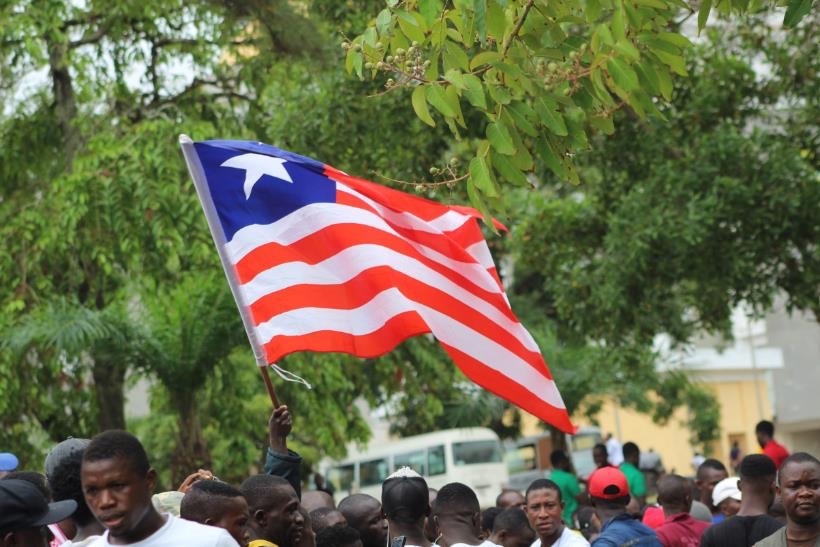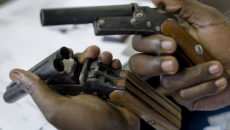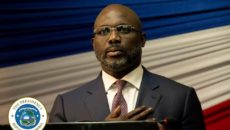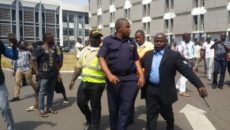When Justice Minister Musa Dean wrote on Dec. 2 that the Council of Patriots could not stage a public protest calling upon President George Weah to step down because it was treasonous to do so, he was being incredibly oblivious of both the constitution and democratic tradition of Liberia. Or perhaps he was shamelessly pandering to the political whims of President Weah.
Ever since the founding of the republic in 1847 as a democracy patterned after the United States of America, the right of the people to free speech, assembly, and “to cause their public servants to leave office… whenever their safety and happiness so require†were permanently enshrined into the constitution. Not even the most recent constitutional rewrite under Samuel Doe’s dictatorship in 1985 attempted to tamper with these rights.
So it came as a great shock to many that the erudite state lawyer who has served previous administrations, would attempt to charge the exercise of the most basic rights of the people, with the most serious crime against the state – treason.
And if Cllr. Dean believes that the Council of Patriots’ ‘Weah Step Down’ campaign is “unconstitutional and bespeaks of treasons,†but that the recent rebuttal protest in Monrovia organized by counter-protesters in support of the president, isn’t, he is being horribly naïve.
There are at least two important legal questions being raised by the protest. Both questions appear to have been resolved by longstanding legislative and judicial precedents if Cllr. Dean had taken the time to research history. The first question is whether or not any citizens’ protest, whatever the purpose, can be justly considered treasonous. The second question is whether or not a citizens’ protest constitutes a legitimate course of presidential removal under the constitution.
As to the first question, the Supreme Court has ruled emphatically in the case Davis v Republic of Liberia [1862] LRSC 2; 1 LLR 17 that treason is “that highest of all crimes” which “can only be committed by an attempt, by conspiracy or otherwise, to destroy the government, by giving aid and comfort to its enemies to accomplish it.” The court ruled that despite the fact that Davis was involved in a riot with the use of firearms, his violent conduct and use of lethal weapons to disturb the peace were insufficient to constitute treason.
But we cannot deny that by articulating a clear intention of seeking the president’s resignation, the Council of Patriots has introduced an important distinction between its protest and the Davis Case, the latter pertaining particularly to rioting and use of arms, without any clear link to government’s removal.
This brings us to the second more important legal question, of whether or not a public call for President Weah’s removal for incompetence and constitutional breaches, according to the protesters, is tantamount to treason, as is alleged by Cllr. Dean.
To be clear, the founding fathers of the republic always held the view that ‘the people’ – in their collectivity – cannot commit treason against the state, for the simple reason that it is they who hold sovereignty. Of course, the constitution has specified only two orderly channels by which the people may exercise their sovereign powers against their elected representatives, including the president – through elections and impeachment. It is here that the justice minister has sought refuge for his misrepresentation of the constitution and allegations of treason against the Council of Patriots.
Even though the constitution specifies elections and impeachment as the only two avenues for removing a sitting president, Cllr. Dean’s Dec. 2 letter highlights only a single path – elections, deliberately omitting impeachment. The reasons for this crucial omission, I presume, is the fact that the only two instances of presidential removal in Liberian history which stemmed from impeachment were directly or indirectly triggered by mass citizen’s actions similar to those being organized by Henry Costa and his Council of Patriots.
When President Edwin J. Roye was removed from office in 1871 on charges of embezzlement and the unconstitutional extension of his term of office from two to four years, he was first deposed and arrested by a crowd of citizens with whom he reportedly exchanged fire. Despite Roye’s deposition by a mass of citizens, the constitution still regarded him as president, short of a formal impeachment process. Sensing the need for a formal impeachment to remove Roye, and fearful that the process of impeachment would be too slow, a Convention of the Legislature convened in which a “Manifesto†or resolution was approved, formally removing Roye from office on Oct. 26, 1871.
The circumstances of Roye’s death shortly thereafter is a mystery and remains highly contested.
In hindsight, legal scholars have condemned Roye’s removal as unconstitutional. In fact, the acclaimed Harvard University lawyer Charles Huberich describes it in his 1947 book The Political and Legislative History of Liberia, as the “first coup d’état in Liberia’s history.†But the prevailing sentiments at the time was quite different. Following Roye’s removal, his successor and Vice President, James S. Smith, was quick to justify his deposition as “the uprising of the sovereign people of the Republic, notwithstanding fire-arms and munitions of war were scattered broadcast to keep him in.â€
Smith continued:
Remonstrance after Remonstrance, and the entreaties of friends, proved equally unavailing until forbearance was regarded no longer a virtue, and the sovereign people of the Republic rose in their might, resumed the delegated powers granted the president and deposed their Chief [Executive] Edward James Roye, in a peaceable yet decisive manner†– Smith, Dec. 4, 1871, in Huberich (1947, 1135).
But Smith quickly pointed an important lesson for the country’s governing class in his Message to the Legislature on the same day:
Though I deplore this sad event… yet I cannot charge my countrymen for a disposition to disregard law and order. I admire their patience, fortitude and discretion. It is, nevertheless, my candid conviction that if the same moderation and discretion had been exercised by the Legislature, this lamentable event might have been avoided by the seasonable intervention of the Judiciary
In effect, Interim President Smith was interpreting the unfortunate circumstances of Roye’s removal as a colossal failure of governance, and laying the blame at the feet of both the Legislature (for failing to swiftly in view of the people’s agitation) and the Judiciary (for failing to intervene in the impasse between the Roye and the Legislature). Smith insisted the people could not be blamed.
The second case of impeachment involving President Charles D. B. King makes more lucid the role of mass actions in removing a president. The evidence from the King’s case appears to suggest that the governing class did, in fact, learn their lesson of the Roye incident when a similar situation arose. The lesson was – never take the people for granted.
In 1930, once it became universally known through a League of Nations investigation that President King, his Vice President Allen Yancy, and senior members of his cabinet, were directly involved in slave trade and the forceful recruitment and export of indigenous men and boys to the Spanish Island of Fernando Po between 1904-1930, and sensing agitation from the people, the legislature did not wait for a riot to erupt. It moved swiftly against President King, opening an impeachment investigation against him, and ultimately forcing him to resign.
Chief Justice Johnson in a 1932 ruling, recounted the House Judiciary Committee Report on the matter:
They [the House Judiciary Committee] recommend[ed] the resignation of President King and his retirement from Office, particularly upon the repeated request of the people of all political parties which if not in words in substance have availed themselves of their constitutional privileges and have asked the Legislature to retire the president. The Committee feels that to deny them of this right would be a breach of the Constitution, and very likely result disastrously to the perpetuity of the nation.
In fact, so concerned was the legislature by the people’s agitation and Roye’s safety, that the House Committee recommended that upon his resignation, King be given “sufficient protection by the government until such time as public sentiments would have subsided.â€
Both the Supreme Court and the Legislature have always held unequivocally that that people’s rights to call for and alter their government, are constitutionally protected. In the most recent attempt by Cllr. Arthur Johnson to prevent the Council of Patriots’ first ‘Save the State’ protest, which, although muted, carried the undertones of a ‘step-down’ request, the court once again upheld the peoples’ right to call upon their government, irrespective of the call or political affiliation of the those making the call. Only a handful of presidents in modern Liberia have sought to weaponize treason as an instrument of intimidation and elimination against their political opponents – Edwin Barclay, Tubman, Tolbert, Doe, Taylor, and now Weah. Except for Barclay and Tubman, all have ended disastrously.
To be clear, I do not argue that the protesters’ charges against President Weah are legitimate in and of themselves. Nor that President Weah is compelled to resign simply because the Council of Patriots has so demanded, although he may on his own volition choose to resign in the interest of peace and stability. Instead, what I argue is that citizens within Liberia’s democratic republic, in their collectivity – small and large – hold the sacred right to demand the removal of their leaders without being accused of treason. And that such mass actions have, in fact, been the necessary triggers for impeachment in the only two cases where it has been invoked against a president.
By his guileless allegations of treason against the Council of Patriots, Justice Minister Dean has shown himself to be grossly injudicious, politically malleable to President Weah, and embarrassingly unfamiliar with both the law and tenets of the Liberian democracy. His allegations of treason ought to be outrightly dismissed by all well-meaning Liberians and friends of Liberia.
Editor’s note: This op-ed has been modified from a previous version, which inadvertently omitted key elements.Â
Featured photo by Lloyd Massah



